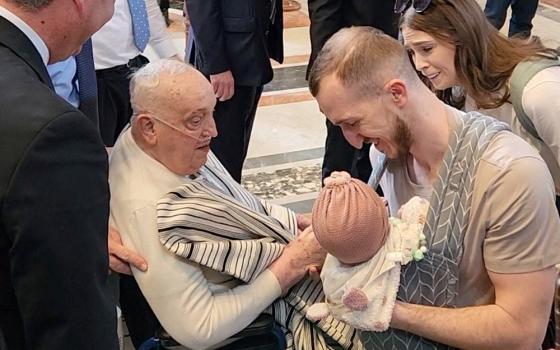Pope Francis coughs as Msgr. Pierluigi Giroli reads his catechesis during his weekly general audience in the Paul VI Audience Hall at the Vatican Feb. 12, 2025. Seated next to the pope, Msgr. Leonardo Sapienza, an official of the Prefecture of the Papal Household, looks on. (CNS/Lola Gomez)
Pope Francis has been diagnosed with pneumonia in both lungs and his latest laboratory tests and chest X-rays continue to reveal a "complex" medical picture, according to a Feb. 18 Vatican statement.
"The chest CT scan that the Holy Father underwent this afternoon … demonstrated the onset of bilateral pneumonia that required further pharmacological therapy," said a Vatican bulletin released at 7:30 p.m. local time on Tuesday evening (Feb. 18).
The statement noted that the 88-year-old pontiff is in a good mood and that he received the Eucharist earlier in the day.
Francis was admitted to hospital for a respiratory tract infection on Feb. 14 after two weeks of what the pope repeatedly referred to as bronchitis.
On Feb. 17, a Vatican bulletin said the test results revealed a "polymicrobial infection" and that due to the "complex" clinical situation, he would require further hospitalization.
To date, Francis' longest hospital stay, a 10-day stint in 2021, was for a surgery that removed a portion of his colon. In 2023, Francis spent three nights in hospital for what was, at the time, described as bronchitis, but later revealed to be pneumonia.
A statement released earlier in the morning of Feb. 18 noted that the pope had rested well during the night before and that he remained in good spirits. The pope also expressed his gratitude for the prayers of support, as well as for some drawings and cards he received from children in the hospital's pediatric oncology unit.
Advertisement
Italian pulmonologist Barbara Moscatelli told the National Catholic Reporter that the type of lung infection that is currently plaguing the pontiff is neither easy to define or to manage.
Polymicrobial infections, she noted are mostly common in "in elderly patients with an immune system that is not quite in the best shape and not able to defend itself independently."
Moscatelli, who is not involved in the pontiff's treatment but is familiar with his medical care team, said there are many types of antibiotics that could be used to treat the condition, which could be administered either orally or directly into the lungs.
Despite his ongoing hospitalization, the pope has continued his almost daily calls with the Catholic parish in Gaza that he has spoken with each night since Israel's war against Hamas began in 2023. According to its pastor, Francis called as recently as Feb. 17.
"He was tired but with a clear voice," said Fr. Gabriel Romanelli. "He asked how we were and thanked us with prayers, and gave us his blessing."
On Feb. 18, the Vatican announced that, as expected, many of this coming weekend's Holy Year events have been canceled or modified. A Feb. 22 papal audience that had been scheduled for the Jubilee for Deacons has now been cancelled and Archbishop Rino Fisichella, the event's organizer, will celebrate the Sunday Mass on Feb. 23.
Inside the Roman Curia — the Vatican's central bureaucracy — business continues to proceed more or less as usual, with high-ranking cardinals and officials continuing with their travel plans and new bishops' appointments being announced daily.
Outside of Rome's Gemelli Hospital, which features a 10th floor suite reserved for the treatment of popes, the world's media looks on and eagerly awaits for any signs of news on the octogenarian pontiff. Late in the afternoon on Tuesday, amid grey clouds above the hospital, a full rainbow pierced through the sky.
NCR staff writer Camillo Barone contributed to this report.
The National Catholic Reporter's Rome Bureau is made possible in part by the generosity of Joan and Bob McGrath.



